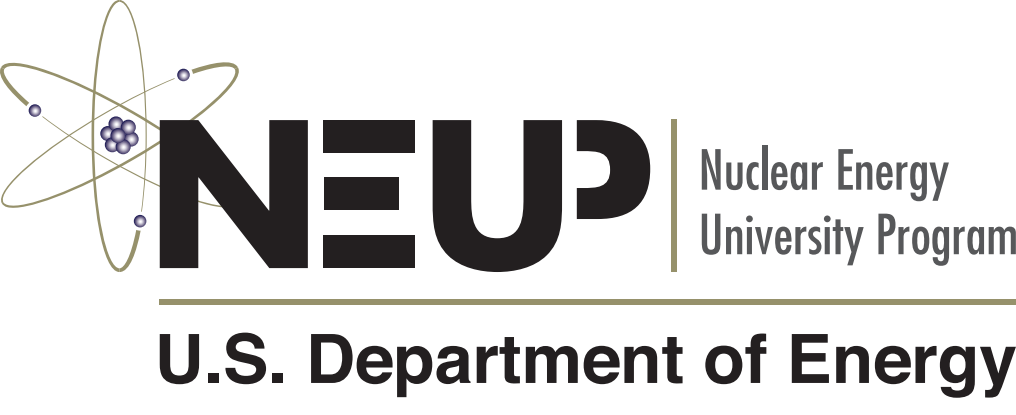Title |
Institution |
Estimated
Funding* |
Award Description |
|
Developing Microstructure-Property Correlation in Reactor Materials using in situ High-Energy X-rays | Argonne National Laboratory | $1,000,000 | Researchers will demonstrate the applications of high energy X-ray measurements with in-situ thermal-mechanical loading to understand the microstructure-property relationship. The gained knowledge is expected to enable accurate predictions of mechanical performance of nuclear reactor materials subjected to extreme environments, and to further facilitate design and development of new materials. |
|
Radiation Hardened Electronics Destined for Severe Nuclear Reactor Environments | Arizona State University | $399,674 | Researchers will develop radiation hard by design (RHBD) electronics using commercially available technology employing commercial off-the-shelf (COTS) devices and present generation circuit fabrication techniques. This project will increase the radiation resilience of more sensitive electronics such that a robot could be employed for post-accident monitoring and sensing purposes as well as for long-term inspection and decontamination missions. |
|
Automated Synchrotron X-ray Diffraction of Irradiated Reactor Pressure Vessel Steels | Brookhaven National Laboratory | $979,200 | Researchers will develop an automated system to rapidly and safely acquire synchrotron data on radioactive samples. Data will be obtained on irradiated Reactor Pressure Vessel (RPV) steels, austenitic stainless steels and ferritic-martensitic steels that will improve the understanding and performance predictions of these materials in nuclear reactor environments. |
|
Self-consolidating concrete construction for modular units | Georgia Institute of Technology | $400,000 | Researchers will develop self-consolidating concrete ("self-compacting concrete" or SCC) mixtures so concrete placement can be made into steel plate composite (SC) modular structures without the need for continuous concrete placement. SCC mixtures will be developed and their use validated to ensure sufficient shear capacity across cold-joints while minimizing shrinkage and temperature increase during curing to enhance concrete bonding with the steel plates. |
|
Improvements in SMR Modular Construction through Supply Chain Optimization and Lessons Learned | Georgia Institute of Technology | $400,000 | Researchers will advance methods for manufacturing Small Modular Reactors (SMRs), improve modular construction techniques and develop best practices for designing and operating supply chains that take advantage of these techniques. The research will identify, address and resolve challenges and deficiencies in the current modular construction approach, thus enhancing the economic attractiveness of SMRs. |
|
Advanced 3D Characterization and Reconstruction of Reactor Materials | Idaho National Laboratory | $1,000,000 | Researchers will use a coordinated effort to link advanced materials characterization methods and computational modeling approaches to better understand and predict the behavior of reactor materials that operate at extreme conditions. The project will address current characterization limitations and enhance recently developed advanced characterization and reconstruction capabilities to allow for efficient characterization of reactor microstructures reconstruction with numerical simulation. |
|
Measuring radiation damage dynamics by pulsed ion beam irradiation | Lawrence Livermore National Laboratory | $1,000,000 | Researchers will develop and demonstrate a novel experimental approach to access the dynamic regime of radiation damage formation processes in nuclear materials. Experimental data on defect interaction dynamics is essential for building physically sound models to describe the formation of stable radiation defects. If successful, this project will establish the pulsed ion beam method as the primary approach to study defect interaction dynamics in nuclear materials. |
|
Determining the stress-strain response of irradiated metallic materials via spherical nanoindentation | Los Alamos National Laboratory | $1,000,000 | Researchers will—through spherical nanoindentation stress-strain analysis—determine the elastic response, elasto-plastic transition, and onset of plasticity in ion-irradiated metallic materials, and compare their relative mechanical behavior to the unirradiated state. This research, and attaining a deeper, physics-based understanding of the effects of irradiation on the material microstructure and its associated mechanical properties, could revolutionize mechanical testing of nuclear materials. |
|
Predictive Characterization of Aging and Degradation of Reactor Materials in Extreme Environments | Northwestern University | $999,812 | Researchers will develop a suite of unique experimental techniques, augmented by a mesoscale computational framework, to understand and predict the long-term effects of irradiation, temperature and stress on material microstructures and their macroscopic behavior. |
|
Radiation Hardened Circuitry Using Mask-Programmable Analog Arrays | Oak Ridge National Laboratory | $400,000 | Researchers will develop and demonstrate a general-purpose data acquisition system built from commercial or near-commercial radiation-hard analog arrays and digital arrays to be the building blocks of a family of future fieldable radiation-hard systems. The result will be a prototype rad-hard data acquisition system constructed and tested to demonstrate functionality and rad-hardness of the identified commercially available technology, as applied to a nuclear reactor environment. |
|
A Method for Quantifying the Dependability Attributes of Software-Based Safety Critical Instrumentation and Control Systems in Nuclear Power Plants | The Ohio State University | $399,990 | Researchers will address the lack of systematic science-based methods for quantifying the dependability attributes in software-based instrumentation and control systems in safety critical application. This research will lead to the development of hybrid causal maps, an advanced representation of knowledge, as well as to a more robust elicitation of causal maps which further enhance the science of elicitation. |
|
Use of Micro- and Meso-Scale Magnetic Characterization Methods to Study Degradation of Reactor Structural Material | Pacific Northwest National Laboratory | $896,983 | Researchers will use magnetic characterization methods at the micro-scale and meso-scale to evaluate the degradation of reactor materials at extreme conditions. These measurements will be correlated with measurements taken at a larger scale using established techniques. If successful, the research will result in the ability to use micro-scale magnetic measurements alone to provide diagnostic information about the materials. |
|
Ultra-High Performance Concrete and Advanced Manufacturing Methods for Modular Construction | University of Houston | $399,999 | Researchers will develop cost-effective ultra-high performance concrete (UHPC) products with 150 MPa (22 ksi) concrete compressive strength without special temperature and pressure treatment, high durability, large-scale process-ability with controlled quality, which can be rapidly prefabricated and assembled for modular construction of new nuclear power plants. |
| |
Total |
$9,275,658 | |

